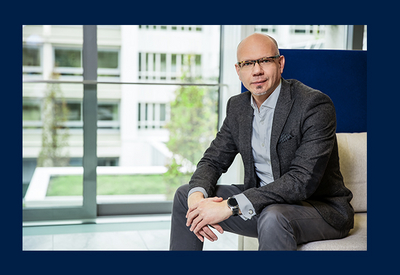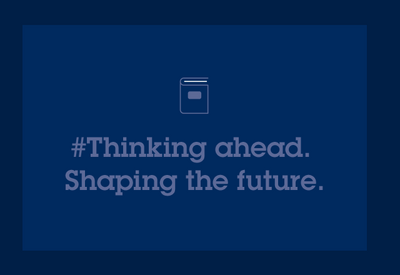YOUR COMPETITIVE ADVANTAGE.
Will everything remain different?
Logistics, retail, office, residential – virtually all property markets have been impacted by the Covid-19 pandemic. In an interview with Prof. Dr Kerstin Hennig, Professor of Real Estate Management at the EBS Universität für Wirtschaft und Recht and Head of EBS Real Estate Management Institute (EBS REMI), and Severin Schöttmer, Managing Director Special Property Finance Aareal Bank, both experts will discuss how the different asset classes will develop.

Prof. Dr. Kerstin Hennig is Professor of Real Estate at the EBS Universität für Wirtschaft und Recht and Head of EBS Real Estate Management Institute (EBS REMI), which organises EBS Universität’s property-related activities into four central areas of activity: university education, research, scientific advice and training.

Severin Schöttmer (Managing Director Special Property Finance) is responsible for several teams at Aareal Bank, including retail property, fund management and logistics property, that have been supporting investors in choosing and financing properties for 20 years.
The corona crisis has also influenced the property markets. What structural, long-term changes due to the pandemic are already foreseeable?
Severin Schöttmer: The Covid-19 pandemic has led to a massive push towards digitalisation, which has acted as a catalyst in some sectors. In retail trade, for example, the transformation to omni-channel accelerated at an extremely fast pace. Growth in the logistics industry increased once again and raised the attractiveness of logistics property in the current market even further.
Kerstin Hennig: That’s how I see it, too. The coronavirus is acting as an accelerant for existing megatrends: digitalisation, urbanisation, new work, health, as well as security, mobility, connectivity and sustainability – the pandemic is significantly reinforcing all of these trends (and will continue to do so) and the impact on the property sector is huge. The pandemic will define and permanently change the office and residential sectors, for example. We can assume that the offices of the future will look very different from today. By this I do not necessarily mean a decline in office space, but a structural change in how that space is used. In future, offices will have to offer more space for employees to meet and exchange information and ideas. At the same time, they must have the option to withdraw for concentrated work. There will be a much greater emphasis on working from home than before the pandemic.
It is also evident from the effects on the urban landscape that the first trends towards suburbanisation are emerging. What does this mean? The affluent suburbs are becoming more attractive – provided the cities have the corresponding facilities, with an urban infrastructure offering, such as schools, kindergartens, shops, green spaces, medical care to fast internet connection and a mobility structure.
There is a lot of talk about the booming logistics sector. Do you agree with this and how do you think logistics property will perform in the years ahead?
Hennig: The logistics sector already boomed in the past – it has metamorphosed in recent years from the poor relation into a very popular asset class. It is now benefiting additionally from the pandemic. With the volume of online trading having increased further, more warehouse space is required.
Schöttmer: It’s true that aside from Covid-19, the logistics sector has also benefited from the various growth drivers that have advanced the sector further. One example worth mentioning is digitalisation, which offers logistics great potential for automating processes. Yet onshoring and nearshoring are other important trends: in other words, more relocation of the distribution facilities close to the production sites and increased storage to create more resilient supply chains. The coronavirus is not the only factor playing a role in this development. Brexit is another component. As was evident to us all during the crisis, everyone is talking about online trading as a growth driver. It is expanding on a huge scale. Another trend is the new range of duties; logistics are moving further away from conventional warehousing and becoming an increasingly relevant element of the value chain.
However, the overall growth trend in logistics is set to continue – always linked of course to current economic performance – and hence the attractiveness of logistics properties for investors. We will no doubt see logistics providers expanding their activities increasingly in the years ahead. Even now, they are already adopting ‘lighter’ production processes, such as product configuration and, above all, returns management.
What properties or asset classes will be particularly in demand after the Covid-19 pandemic?
Schöttmer: As long as the current low interest rate environment persists, property as a whole will remain an attractive investment – in fact, we could even see greater demand for property with a stable cash flow. Because of the aforementioned growth drivers, investors remain focused on property, especially the logistics segment, offering a favourable return.
Hennig: It will keep going – just differently. We have all learned a lot in the pandemic and that knowledge will continue to reverberate when the pandemic is over. As was already mentioned, the big question defining office properties and the residential trends of the future will be how jobs can be completed as efficiently as possible – for both the employer and the employee. The answers to this question have the same impact on residential and office property as they will on the urban districts of the future.
Changes are also expected in the hotel industry. It is quite conceivable, for example, that fewer business trips will be made in the future; this is down to the new experiences made in relation to digital conferencing as well to the constant development towards sustainability. The focus here is likely to be on quality rather than quantity. Holiday travel, on the other hand, is likely to be similar to pre-pandemic times, as the rewarding elements of relaxation and travel will remain a priority. These developments will be reflected in the future supply of hotel properties.
What role does sustainability play in relation to the future development of the property market?
Hennig: A huge role – sustainability is probably the most important megatrend of all. The UN is actively reinforcing and substantiating sustainability with the adoption of the ESG targets. The property sector must also contribute towards this sustainable change; not only through certified buildings but above all through the sustainable development of cities and buildings. I view the ecological and social aspects as going hand in hand, where I see a shift away from the shareholder and towards the stakeholder approach.
Schöttmer: I couldn’t agree more. Sustainability has been a focal point for investors and tenants for several years (or even decades) now, and is becoming an increasingly important factor. A sustainable orientation is increasingly becoming a simple, basic requirement, especially for new builds. Sustainability is developing on the basis of the current demand for the new market standard.
Prof. Dr. Hennig, Mr Schöttmer, many thanks for the interview!

Prof. Dr Kerstin Hennig
EBS Universität für Wirtschaft und Recht, Head of EBS Real Estate Management Institute
Keeping up with the trends
The economy and society are undergoing profound change. Aareal Bank actively helps to shape this transformation process.

![[Translate to English:]](../../fileadmin/_processed_/b/6/csm_aareal_navi-teaser_konzern@2x_f3a163abdc.png)

![[Translate to English:]](../../fileadmin/_processed_/f/e/csm_aareal_navi-teaser_transaktions-highlights@2x_475e048233.png)















